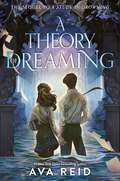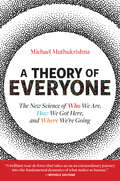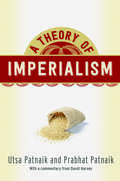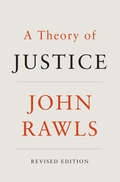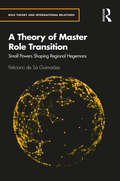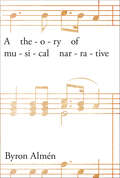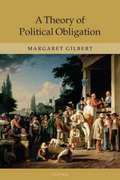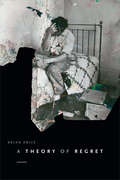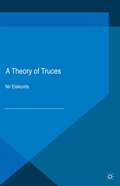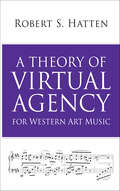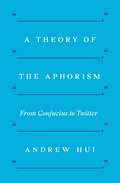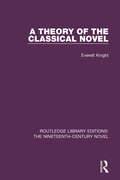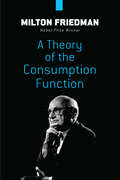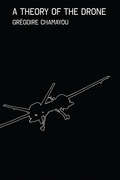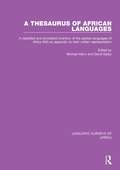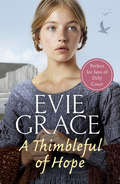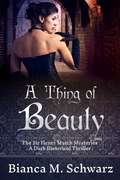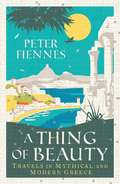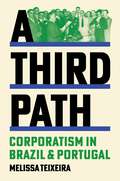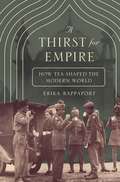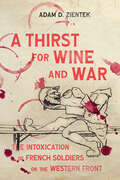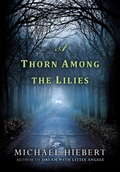- Table View
- List View
A Theory of Dreaming: Sequel to A Study in Drowning (A Study in Drowning)
by Ava ReidReturn to the immersive, lush, and dreamlike world of the instantly bestselling dark academia fantasy A Study in Drowning as the aftermath of their first discovery pulls Effy and Preston on a final adventure and brings their haunting love story to its end in this stunning sequel and final book in the duology.All stories come to an end. Effy learned that when she defeated the Fairy King. Even though she may never know exactly what happened at Hiraeth, she is free of her nightmares and is able to pen a thesis with Preston on the beloved national fairy tale Angharad. She has finally earned a spot at the literature college, making her the first woman in history to enroll.But some dreams are dangerous, especially when they come true. The entire university—and soon the entire nation—is waiting for her to fail. With the Fairy King defeated and Myrddin’s legacy exposed, Effy can no longer escape into fantasy. Who is she without her stories?With Effy under threat, Preston is surprised to discover a rage simmering inside him, ringing in his ears like bells. He begins to dream of a palace under the sea, a world where he is king—visions that start to follow him even in waking.As the war between Llyr and Argant explodes, Effy and Preston find themselves caught in the crossfire: Effy losing her dreams and Preston losing himself in his.Are dreams ever truly just dreams?
A Theory of Everyone: The New Science of Who We Are, How We Got Here, and Where We’re Going
by Michael MuthukrishnaA blueprint for a better future that offers a unified theory of human behavior, culture, and society.Playing on the phrase &“a theory of everything&” from physics, Michael Muthukrishna&’s ambitious, original, and deeply hopeful book A Theory of Everyone draws on the most recent research from across the sciences, humanities, and the emerging field of cultural evolution to paint a panoramic picture of who we are and what exactly makes human beings different from all other forms of life on the planet. Muthukrishna argues that it is our unique ability to create culture, a shared body of knowledge, skills, and experience passed on from generation to generation, that has enabled our current dominance. But it is only by understanding and applying the laws of life—the need for energy, innovation, cooperation, and evolution—that we can solve the practical and existential challenges we face as a species. A Theory of Everyone attempts to provide solutions for the most pressing problems of our collective future, such as polarization, inequality, the &“great stagnation&” in productivity, and the energy crisis.Casting a bold and wide net, Muthukrishna&’s book is a must-read for anyone interested in a better future for ourselves and for generations to come.
A Theory of History (Routledge Library Editions: Historiography)
by Agnes HellerThis radical analysis of the role and importance of historiography interprets the philosophy and theory of history on the basis of historicity as a human condition. The book examins the norms and methods of historiography from a philosophical point of view, but rejects generalisations tht the philosophy of history can provide all the answers to contemporary problems. Instead it outlines a feasible theory of history which is still radical enough to apply to all social structures.
A Theory of Housing Provision under Capitalism (Marx, Engels, and Marxisms)
by Mike BerryThis book provides the first coherent Marxist analysis of the central importance of housing in the social reproduction of capitalism as a whole. Rather than consigning housing to the sidelines, Berry argues that the circulation of capital and revenues though housing and the built environment helps explain how the capital-labour relation constrains housing outcomes while also being reproduced on an extended scale. He shows how housing is provided by the intervention of building, property and interest-bearing capital fractions; how the land question can be explained by a theory of urban land rent, drawing on Marx's categories of differential and monopoly rent; how housing is vital to the extended reproduction of labour power, while also creating a semi-separate sphere of 'home' in which gender and demographic factors overlay and accentuate social class position. The modes, impact and drivers of state intervention in housing provision are seen to modify the patterns and pace of capital circulation through housing and the urban built environment with implications for shifts in class fragmentation and power relations.
A Theory of Imperialism
by Utsa Patnaik Prabhat PatnaikIn A Theory of Imperialism, economists Utsa Patnaik and Prabhat Patnaik present a new theory of the origins and mechanics of capitalism that sounds an alarm about its ongoing viability. Their theory centers on trade between the core economies of the global North and the tropical and subtropical countries of the global South and considers how the Northern demand for commodities (such as agricultural products and oil) from the South has perpetuated and solidified an imperialist relationship. The Patnaiks explore the dynamics of this process and discuss innovations that could allow the economies of the South to achieve greater prosperity without damaging the economies of the North. The result is an original theory of imperialism that brings to light the crippling limitations of neoliberal capitalism.A Theory of Imperialism also includes a response by David Harvey, who interprets the agrarian system differently and sees other factors affecting trade between the North and the South. Their debate is one of the most provocative exchanges yet over the future of the global economy as resources grow thin, populations explode, and universal prosperity becomes ever more elusive.
A Theory of International Crisis Lending and IMF Conditionality
by Jonathan D. Ostry Olivier Jeanne Jeromin ZettelmeyerA report from the International Monetary Fund.
A Theory of Justice
by John RawlsRawls aims to express an essential part of the common core of the democratic tradition- justice as fairness- and to provide an alternative to utilitarianism, which had dominated the Anglo-Saxon tradition of political thought since the nineteenth century.
A Theory of Master Role Transition: Small Powers Shaping Regional Hegemons (Role Theory and International Relations)
by Feliciano de Sá GuimarãesIn this book, Feliciano de Sá Guimarães offers an original application of Role Theory. He proposes a theory of master role transitions to explain how small powers can change regional powers’ master roles without changing the regional material power distribution.Master role transition is the replacement of an active dominant master role by a dormant or inactive role located within one’s role repertoire. Guimarães argues that only a combination of four necessary conditions can produce a full master role transition: asymmetrical material interdependence, altercasting, domestic contestation and regional contestation. In each one of these conditions, a small power uses material and ideational tools to promote a master role transition within the regional power role repertoire. To test his model, Guimarães turns to five case studies in Latin America, Southern Africa and South Asia: the 2006–2007 Bolivia–Brazil gas crisis, the 2008–2009 Paraguay–Brazil Itaipú Dam crisis, the 2008–2009 Ecuador–Brazil Odebrecht crisis, the 1998 South Africa–Lesotho military intervention crisis and the 1996India–Bangladesh Ganges water crisis.A Theory of Master Role Transition is an excellent resource for those studying both theory and method in International Relations and foreign policy analysis.
A Theory of Musical Narrative (Musical Meaning and Interpretation)
by Byron AlménByron Almén proposes an original synthesis of approaches to musical narrative from literary criticism, semiotics, historiography, musicology, and music theory, resulting in a significant critical reorientation of the field. This volume includes an extensive survey of traditional approaches to musical narrative illustrated by a wide variety of musical examples that highlight the range and applicability of the theoretical apparatus. Almén provides a careful delineation of the essential elements and preconditions of musical narrative organization, an eclectic analytical model applicable to a wide range of musical styles and repertoires, a classification scheme of narrative types and subtypes reflecting conceptually distinct narrative strategies, a wide array of interpretive categories, and a sensitivity to the dependence of narrative interpretation on the cultural milieu of the work, its various audiences, and the analyst. A Theory of Musical Narrative provides both an excellent introduction to an increasingly important conceptual domain and a complex reassessment of its possibilities and characteristics.
A Theory of Political Obligation: Membership, Commitment, and the Bonds of Society
by Margaret GilbertMargaret Gilbert offers an incisive new approach to a classic problem of political philosophy: when and why should I do what the laws of my country tell me to do? Beginning with carefully argued accounts of social groups in general and political societies in particular, the author argues that in central, standard senses of the relevant terms membership in a political society in and of itself obligates one to support that society's political institutions. The obligations in question are not moral requirements derived from general moral principles, as is often supposed, but a matter of one's participation in a special kind of commitment: joint commitment. An agreement is sufficient but not necessary to generate such a commitment. Gilbert uses the phrase 'plural subject' to refer to all of those who are jointly committed in some way. She therefore labels the theory offered in this book the plural subject theory of political obligation. The author concentrates on the exposition of this theory, carefully explaining how and in what sense joint commitments obligate. She also explores a classic theory of political obligation --- actual contract theory --- according to which one is obligated to conform to the laws of one's country because one agreed to do so. She offers a new interpretation of this theory in light of a theory of plural subject theory of agreements. She argues that actual contract theory has more merit than has been thought, though the more general plural subject theory is to be preferred. She compares and contrasts plural subject theory with identification theory, relationship theory, and the theory of fair play. She brings it to bear on some classic situations of crisis, and, in the concluding chapter, suggests a number of avenues for related empirical and moral inquiry. Clearly and compellingly written, A Theory of Political Obligation will be essential reading for political philosophers and theorists.
A Theory of Regret
by Brian PriceIn A Theory of Regret Brian Price contends that regret is better understood as an important political emotion than as a form of weakness. Price shows how regret allows us to see that our convictions are more often the products of our perceptual habits than the authentic signs of moral courage that we more regularly take them to be. Regret teaches us to give up our expectations of what we think should or might occur in the future, and also the idea that what we think we should do will always be the right thing to do. Understood instead as a mode of thoughtfulness, regret helps us to clarify our will in relation to the decisions we make within institutional forms of existence. Considering regret in relation to emancipatory theories of thinking, Price shows how the unconditionally transformative nature of this emotion helps us become more sensitive to contingency and allows us, in turn, to recognize the steps we can take toward changing the institutions that shape our lives.
A Theory of Truces (Palgrave Studies in Ethics and Public Policy)
by Nir EisikovitsThis book argues that understanding truces is crucial for our ability to wind down wars. We have paid too much attention to the idea of permanent peace, yet few conflicts end in this way. The book describes how truce makers think, which truces can be morally justified and provides a philosophical history of truce making in the Western tradition.
A Theory of Virtual Agency for Western Art Music (Musical Meaning and Interpretation)
by Robert S. HattenIn his third volume on musical expressive meaning, Robert S. Hatten examines virtual agency in music from the perspectives of movement, gesture, embodiment, topics, tropes, emotion, narrativity, and performance. Distinguished from the actual agency of composers and performers, whose intentional actions either create music as notated or manifest music as significant sound, virtual agency is inferred from the implied actions of those sounds, as they move and reveal tendencies within music-stylistic contexts. From our most basic attributions of sources for perceived energies in music, to the highest realm of our engagement with musical subjectivity, Hatten explains how virtual agents arose as distinct from actual ones, how unspecified actants can take on characteristics of (virtual) human agents, and how virtual agents assume various actorial roles. Along the way, Hatten demonstrates some of the musical means by which composers and performers from different historical eras have staged and projected various levels of virtual agency, engaging listeners imaginatively and interactively within the expressive realms of their virtual and fictional musical worlds.
A Theory of the Aphorism: From Confucius to Twitter
by Andrew HuiAn engaging look at the aphorism, the shortest literary form, across time, languages, and culturesAphorisms—or philosophical short sayings—appear everywhere, from Confucius to Twitter, the Buddha to the Bible, Heraclitus to Nietzsche. Yet despite this ubiquity, the aphorism is the least studied literary form. What are its origins? How did it develop? How do religious or philosophical movements arise from the enigmatic sayings of charismatic leaders? And why do some of our most celebrated modern philosophers use aphoristic fragments to convey their deepest ideas? In A Theory of the Aphorism, Andrew Hui crisscrosses histories and cultures to answer these questions and more.With clarity and precision, Hui demonstrates how aphorisms—ranging from China, Greece, and biblical antiquity to the European Renaissance and nineteenth century—encompass sweeping and urgent programs of thought. Constructed as literary fragments, aphorisms open new lines of inquiry and horizons of interpretation. In this way, aphorisms have functioned as ancestors, allies, or antagonists to grand systems of philosophy.Encompassing literature, philology, and philosophy, the history of the book and the history of reading, A Theory of the Aphorism invites us to reflect anew on what it means to think deeply about this pithiest of literary forms.
A Theory of the Classical Novel (Routledge Library Editions: The Nineteenth-Century Novel #23)
by Everett KnightFirst published in 1969, this book asserts that two concepts, structure and praxis, make it impractical for scholars to ignore the necessity of a theory of the novel — with the term ‘classical novel’ used to cover western fiction. The author argues that the novel is fundamentally an ‘enterprise’ — an aspect of the praxis of a particular social class — and that the ways of orthodox scholarship are also a praxis. The investigator must enquire into the nature of their questions as those traditionally put to literature are inspired by ‘irrelevant’ nineteenth century positivism. In the author’s view the book is necessarily a theory of the classical novel and a manifesto for the student movement.
A Theory of the Consumption Function
by Milton FriedmanIn this groundbreaking work, a Nobel Prize-winning economist addresses the consumption behavior of individuals and how it can be defined in a way that is supported by empirical evidence and useful for research and planning. Milton Friedman introduced a distinction between "measured income," what an individual earns in a specific period, and "permanent income," a view that takes into account a longer period in an active economic life. He was thus able to suggest that consumption tends to be, on average, the same fraction of permanent income regardless of the income's extent and that the magnitude of the fraction depends on many variables, including interest rates and family size. Dr. Friedman was among the most prominent American economists of the twentieth century, a powerful advocate of free market capitalism, and one of the founders of the well-known Chicago School of Economics. The concepts he introduced in this thought-provoking book achieved broad acceptance, stimulating further study and developing far-reaching effects on economic theory.
A Theory of the Drone
by Grégoire ChamayouDrone warfare has raised profound ethical and constitutional questions both in the halls of Congress and among the U.S. public. Not since debates over nuclear warfare has American military strategy been the subject of discussion in living rooms, classrooms, and houses of worship. Yet as this groundbreaking new work shows, the full implications of drones have barely been addressed in the recent media storm.In a unique take on a subject that has grabbed headlines and is consuming billions of taxpayer dollars each year, philosopher Grégoire Chamayou applies the lens of philosophy to our understanding of how drones are changing our world. For the first time in history, a state has claimed the right to wage war across a mobile battlefield that potentially spans the globe. Remote-control flying weapons, he argues, take us well beyond even George W. Bush's justification for the war on terror.What we are seeing is a fundamental transformation of the laws of war that have defined military conflict as between combatants. As more and more drones are launched into battle, war now has the potential to transform into a realm of secretive, targeted assassinations of individuals--beyond the view and control not only of potential enemies but also of citizens of democracies themselves. Far more than a simple technology, Chamayou shows, drones are profoundly influencing what it means for a democracy to wage war. A Theory of the Drone will be essential reading for all who care about this important question.
A Thesaurus of African Languages: A Classified and Annotated Inventory of the Spoken Languages of Africa With an Appendix on Their Written Representation (Linguistic Surveys of Africa #1)
by Michael Mann David DalbyOriginally published in 1987, this thesaurus is concerned with the spoken languages of Africa. Languages are grouped into a relatively large number of sets and subsets within which the relationship of languages to one another is locally apparent and uncontroversial. The volume presents the languages in classified order with notes on each language, their variant names and immediate classification, and reference to the sources consulted. One section offers an exhaustive list of the languages spoken as home languages by local communities in each state, together with details of languages widely used for inter-group communication, given official recognition, or used in education or the media. There are brief phonological analyses of a broad sample of some 20 African languages and a comprehensive bibliography and language index to the whole work
A Thimbleful of Hope
by Evie Grace_______________________________________________A tale of triumph over adversity from the author of the Maids of Kent trilogy. Perfect for fans of Dilly Court and Rosie Goodwin.'Heart-tugging saga of which Catherine Cookson would’ve approved' Peterborough Evening Telegraph‘A charming historical read that hits all the right notes’ Woman’s Weekly_______________________________________________Dover, 1864: Violet Rayfield leads a happy life with her family in a beautiful terrace on Camden Crescent. But Violet’s seemingly perfect world is shattered when her father makes a decision that costs her family everything. Now Violet must sacrifice all she holds dear, including the man she loves. As Violet strives to pick up the threads of her existence, a series of shocking revelations leaves her feeling even more alone.But where one door closes, another opens, and the embroidery skills Violet perfected while a young woman of leisure win her vital work. If she can find the strength to stitch the remnants of her family back together, there might just be a little hope after all…
A Thing of Beauty (The Sir Henry March Mysteries #1)
by Bianca SchwarzNovember 1819. To the ordinary observer, the wealthy Sir Henry March, cousin of a duke, seems a typical London gentleman. But to the Crown, Henry is a powerful asset, secret defender of the country. When he sees an injured girl stumbling down the side of the road, he must stop. The stepdaughter of an abusive innkeeper, Eliza Broad is from another class entirely. But the moment Henry lays eyes on the spirited and beautiful girl, he feels a connection. To protect her, he takes her in to his home. In Henry, Eliza finds a rescuer, handsome and kind beyond her wildest dreams. But danger is at their heels. On Eliza's trail is one of London's vilest and most notorious pimps, a man whose connections tie him to a dark world of sadism and treachery. Can Eliza and Henry fight to protect England, their hearts, and their lives?
A Thing of Beauty: Travels in Mythical and Modern Greece
by Peter Fiennes&‘Essential reading&’ Helen Morales What do the Greek myths mean to us today? It&’s now a golden age for these tales – they crop up in novels, films and popular culture. But what&’s the modern relevance of Theseus, Hera and Pandora? Were these stories ever meant for children? And what&’s to be seen now at the places where heroes fought and gods once quarrelled? Peter Fiennes travels to the sites of some of the most famous Greek myths, on the trail of hope, beauty and a new way of seeing what we have done to our world. Fiennes walks through landscapes – stunning and spoiled – on the trail of dancing activists and Arcadian shepherds, finds the &‘most beautiful beach in Greece&’, consults the Oracle, and loses himself in the cities, remote villages and ruins of this storied land.
A Third Path: Corporatism in Brazil and Portugal (Histories Of Economic Life Ser. #4)
by Melissa TeixeiraHow Brazil and Portugal experimented with corporatism as a &“third path&” between laissez-faire capitalism and communism Following the Great Depression, as the world searched for new economic models, Brazil and Portugal experimented with corporatism as a &“third path&” between laissez-faire capitalism and communism. In a corporatist society, the government vertically integrates economic and social groups into the state so that it can manage labor and economic production. In the 1930s, the dictatorships of Getúlio Vargas in Brazil and António de Oliveira Salazar in the Portuguese Empire seized upon corporatist ideas to jump-start state-led economic development. In A Third Path, Melissa Teixeira examines these pivotal but still understudied initiatives.What distinguished Portuguese and Brazilian corporatism from other countries&’ experiments with the mixed economy was how Vargas and Salazar dismantled liberal democratic institutions, celebrating their efforts to limit individual freedoms and property in pursuit of economic recovery and social peace. By tracing the movement of people and ideas across the South Atlantic, Teixeira vividly shows how two countries not often studied for their economic creativity became major centers for policy experimentation. Portuguese and Brazilian officials created laws and agencies to control pricing and production, which in turn generated new social frictions and economic problems, as individuals and firms tried to evade the rules. And yet, Teixeira argues, despite the failings and frustrations of Brazil&’s and Portugal&’s corporatist experiments, the ideas and institutions tested in the 1930s and 1940s constituted a new legal and technical tool kit for the rise of economic planning, shaping how governments regulate labor and market relations to the present day.
A Thirst for Empire: How Tea Shaped the Modern World
by Erika RappaportHow the global tea industry influenced the international economy and the rise of mass consumerismTea has been one of the most popular commodities in the world. Over centuries, profits from its growth and sales funded wars and fueled colonization, and its cultivation brought about massive changes—in land use, labor systems, market practices, and social hierarchies—the effects of which are with us even today. A Thirst for Empire takes a vast and in depth historical look at how men and women—through the tea industry in Europe, Asia, North America, and Africa—transformed global tastes and habits and in the process created our modern consumer society.As Erika Rappaport shows, between the seventeenth and twentieth centuries the boundaries of the tea industry and the British Empire overlapped but were never identical, and she highlights the economic, political, and cultural forces that enabled the British Empire to dominate—but never entirely control—the worldwide production, trade, and consumption of tea. Rappaport delves into how Europeans adopted, appropriated, and altered Chinese tea culture to build a widespread demand for tea in Britain and other global markets and a plantation-based economy in South Asia and Africa. Tea was among the earliest colonial industries in which merchants, planters, promoters, and retailers used imperial resources to pay for global advertising and political lobbying. The commercial model that tea inspired still exists and is vital for understanding how politics and publicity influence the international economy.An expansive and original global history of imperial tea, A Thirst for Empire demonstrates the ways that this fluid and powerful enterprise helped shape the contemporary world.
A Thirst for Wine and War: The Intoxication of French Soldiers on the Western Front (Intoxicating Histories)
by Adam D. ZientekBeginning in the fall of 1914, every French soldier on the Western Front received a daily ration of wine from the army. At first it was a modest quarter litre, but by 1917 it had increased to the equivalent of a full bottle each day. The wine ration was intended to sustain morale in the trenches, making the men more willing to endure suffering and boredom. The army also supplied soldiers with doses of distilled alcohol just before attacks to increase their ferocity and fearlessness. This strategic distribution of alcohol was a defining feature of French soldiers’ experiences of the war and amounted to an experimental policy of intoxicating soldiers for military ends.A Thirst for Wine and War explores the French army’s emotional and behavioural conditioning of soldiers through the distribution of a mind-altering drug that was later hailed as one of the army’s “fathers of victory.” The daily wine ration arose from an unexpected set of factors including the demoralization of trench warfare, the wine industry’s fear of losing its main consumers, and medical consensus about the benefits of wine drinking. The army’s related practice of distributing distilled alcohol to embolden soldiers was a double-edged sword, as the men might become unruly. The army implemented regulations and surveillance networks to curb men’s drinking behind the lines, in an attempt to ensure they only drank when it was useful to the war effort. When morale collapsed in spring 1917, the army lost control of this precarious system as drunken soldiers mutinied in the thousands. Discipline was restored only when the army regained command of soldiers’ alcohol consumption.Drawing on a range of archives, personal narratives, and trench journals, A Thirst for Wine and War shows how the French army’s intoxication of its soldiers constituted a unique exercise of biopower deployed on a mass scale.
A Thorn Among the Lilies
by Michael HiebertIn Michael Hiebert's haunting and powerful novel, a long-ago tragedy echoes through small-town Alabama as one woman tries to track down a serial killer. Detective Leah Teal is privy to most of the secrets in her hometown of Alvin, but there are always surprises to be had. Like the day she agrees to take her daughter, Caroline, to see a psychic for a reading. The psychic hones in on Leah instead, hinting at a string of gruesome killings and insisting that she intervene to prevent more deaths. When you go looking for trouble, you never know how much you'll find. Sure enough, the psychic's scant clues lead Leah to a cold case from six years ago, when a young woman was found shot to death, her eyelids sewn shut. As Leah digs deeper into old files, a second unsolved case surfaces with the same grisly pattern. While her shrewd young son, Abe, observes from the sidelines, Leah races to prevent another horrific murder, unaware of just how deep the roots of evil can go. Taut, suspenseful, and rich in Southern atmosphere, A Thorn Among the Lilies is a mesmerizing novel of loss and vengeance, and the lengths some will go to out of loyalty and love.
